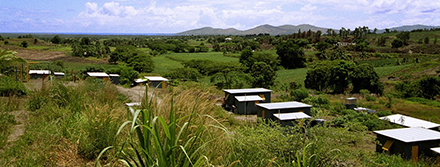Mr Apisai Moce is the founder of the Fortunate Ministry which caters for homeless people living on the streets of Lautoka, Tavua and Rakiraki in Fiji. From humble beginnings in the highlands of Nadarivatu, Apisai Moce considered himself blessed when he successfully completed his studies at the University of New England, in Armidale, Australia. Source: Fiji Sun
Growing up, the Rewasau native, from Nabobuco in Naitasiri, had dreams of becoming a missionary, since his father is an Assemblies of God pastor and his family is heavily involved in church ministry.
“After High School, I opted to do Marine Engineering at FNU, but had to drop out halfway because my parents couldn’t afford my university fees,” he said.
“On the brighter side, I applied for a PSC Scholarship to do a two-year program at the Forestry Training Centre for the Ministry of Forestry.
“I graduated with an Advance Certificate in Forest Management and was inducted into the Ministry of Forestry as a Forest Guard,”
His position involves forest regulatory operations and reforestation activities within a beat area to ensure the sustainable management of forest resources. He is based in Lautoka under the Western Extension Division.
Content with his work, Mr Moce could not fathom that he would be awarded with an Australian Awards Scholarship in 2018, which would allow him to study in an Undergraduate programme in Bachelor of Sustainability majoring in Environmental Resilience.
After working for five years, he was given the scholarship to further his education.
“This is a multi-dimensional degree which integrate social science and humanities with environmental and natural resource management that guides you to have a broader understanding of sustainability,” he said.
“There is also a need for the public to understand the three main pillars of sustainability; economic, social and environmental which needs to be considered on any forest development they wish to implement.”
Mr Moce is anticipating furthering his education at either Bangor University in Wales to do a Master’s Degree in AgroForestry and Food Security, or at the University of British Columbia in Canada to do Masters of Forestry in Sustainable Forest Management.






